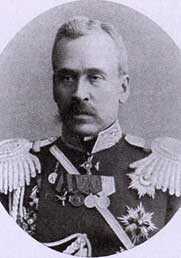Yakov Zhilinskiy
| Yakov Zhilinski | |
|---|---|
 | |
| Native name | Яков Григорьевич Жилинский |
| Born |
March 15, 1853 Mikhaylov, Ryazan Oblast, Russia |
| Died |
1918 Russia |
| Allegiance |
|
| Service/branch | Russian Imperial Army |
| Years of service | 1876-1917 |
| Rank | General |
| Commands held |
|
| Battles/wars | |
Yakov Zhilinski (Russian: Яков Григорьевич Жилинский March 15, 1853 – 1918) was Chief of Staff of the Imperial Russian Army in Manchuria during the Russo-Japanese War, Governor-General of Warsaw, and Chief of Staff of all Russian forces until 1914, and thereafter a field commander during the first year of World War I until he was relieved of command.
Biography
Zhilinsky was born into a family of minor nobility from Mikhaylov, Ryazan Oblast. .[1] He graduated from the Nicholas Cavalry School in St. Petersburg in 1876, and was assigned to the Horse Guards Regiment of the Imperial Guard as a cornet. In 1883, he graduated from General Staff Academy, and after serving as a senior aide to the staff of the 1st Grenadier Division, he served from February 14, 1894 on the Military Scientific Committee of the General Staff, a military intelligence organization responsible for the study of foreign countries.
During the Spanish-American War Zhilinsky was Russian military observer with the Spanish Army in Cuba. On his return, he published a book on the war, which analyzed the causes of the defeat of Spain.[1] In 1899, Zhilinsky served as a member of Russian delegation at the Hague Peace Conference. He was appointed commander of the 52nd Dragoons Regiment from August 1899. In 1900, he was promoted to the rank of major general and was appointed Quartermaster general.
In the Russo-Japanese War (1904–1905), Zhilinsky was Chief of Staff to the Viceroy of the Far East, Admiral Yevgeni Alexeyev, until Alexeyev was dismissed in October 1904.[1] He remained in the combat zone to serve the Minister of War, Aleksey Kuropatkin until the end of the conflict. From January 27, 1906 he was commander of the 14th Cavalry Division in Poland, and from July 7, 1907 of the 10th Army Corps. Promoted to Cavalry general on April 18, 1910, Zhilinsky was appointed commander of the Warsaw Military District and Governor-General of Warsaw in 1911.
Zhilinsky also served from February 22, 1911 to March 4, 1914 as Chief of Staff of the Imperial Russian Army. At the beginning of World War I, he assumed command of the Northwestern Front. The Northwestern Front included the 1st Army and 2nd Army under the command of General Paul von Rennenkampf and General Alexander Samsonov. After the unsuccessful East Prussian Campaign and the losses at the Battle of Tannenberg and the First Battle of the Masurian Lakes, he was relieved of command despite his best attempts to blame Rennenkampf for the fiasco.[2] Zhilinsky was sent as a military representative to France from 1915-1916. He was recalled to Russia in the autumn of 1916. On September 19, 1917, he was ordered to retire.[1]
After the October Revolution, he attempted to flee Russia, but was captured and executed by the Bolsheviks in south Russia in 1918.[3]
Honors
Order of St. Stanislaus, 3rd degree, 1880.
Order of St. Anne, 3rd degree, 1888
Order of St. Stanislaus, 2nd degree, 1894.
Order of St. Anne, 2nd degree, 1896
.png) Order of St Vladimir, 4th degree, 1899
Order of St Vladimir, 4th degree, 1899.png) Order of St Vladimir, 3rd degree, 1902
Order of St Vladimir, 3rd degree, 1902Order of St. Stanislaus, 1st degree with swords, 1904.
Order of St. Anne, 1st degree with swords, 1905
.png) Order of St Vladimir, 2nd degree, 1906
Order of St Vladimir, 2nd degree, 1906 Order of the White Eagle, 1912
Order of the White Eagle, 1912 Order of St. Alexander Nevsky, 1913
Order of St. Alexander Nevsky, 1913
Notes
References
 Chisholm, Hugh, ed. (1922). "Zhilinsky, Yakov". Encyclopædia Britannica (12th ed.). London & New York.
Chisholm, Hugh, ed. (1922). "Zhilinsky, Yakov". Encyclopædia Britannica (12th ed.). London & New York.- Kowner, Rotem. Historical Dictionary of the Russo-Japanese War. The Scarecrow Press (2006). ISBN 0-8108-4927-5
- Losher, John D. The Bolsheviks: Twilight of the Romanov Dynasty. Author House (2009) ISBN 1449023263
External links
- Biography at firstworldwar.com
| |||||